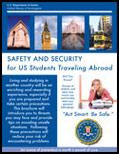International Travel
“Know Before You Go”
All countries have specific rules and regulations related to travel depending on the proposed destination, what you plan on taking with you, the nature of the activities associated with the travel, and with whom you will be working. Certain activities or exports may require a federally-issued license(s) for collaborations or exchanges of technical information. Certain companies, persons and universities are prohibited from certain practices including research collaboration. The following points of concern are those most often implicated by international travel or collaborations abroad and the various federal regulations and embargoes/economic sanctions requiring compliance prior to travel. Additional information is available at Hand-Carry Tools.
Destination
The “Florida Travel Act” Section 1011.90(6), Florida Statutes, prohibits State-funded official travel to countries designated as “state sponsor of terrorism” (Cuba, Iran, Sudan, Syria).
Travel to countries under a State Department travel warning must comply with UCF Policy 2-903 “Travel to Restricted Destinations” are available at: http://internationalization.ucf.edu/restricted_travel.php. Travel warning countries are listed at: https://travel.state.gov/content/passports/en/alertswarnings.html.
Travel to countries under a U.S. sanction or embargo may require specific government approval. Certain financial transactions and services of value are prohibited. Information concerning U.S. Sanctions programs and country specific requirements is available at: http://www.treasury.gov/resource-center/sanctions/Programs/Pages/Programs.aspx.
International travel must not involve the export of defense articles, data or performance of defense services, including instruction (see http://www.pmddtc.state.gov/embargoed_countries/index.html). This includes research collaborations involving research conducted in the U.S. subject to restrictions that does not otherwise qualify as “fundamental research.”

Restricted Parties, Entities, Universities, Persons & Companies
Certain foreign persons – including businesses, research institutions, universities, government and private organizations and other types of legal persons –may be subject to specific federal prohibitions, including prohibitions on research collaborations, for a variety of reasons and require specific licensing, even for educational exchange and are specified on the Entity List available at: http://www.bis.doc.gov/policiesandregulations/ear/744_supp4.pdf Other parties are specified at: http://export.gov/ecr/eg_main_023148.asp It is important to review the Entity List and understand compliance responsibilities and limitations before collaborating, or sponsoring an employee or visiting scholar of a university listed therein. The government has issued specific guidance pertaining to such activities at: http://www.bis.doc.gov/entities/entitylistfaq.html#28 Educational exchange, including travel to any entity on the list has specific license requirements and exclusions typically do not apply. The government has a policy of denial for licensing many of these entities.
Purpose of the Trip
Presentations & Seminars
Foreign Collaborations & Exchanges of Technical Information
Research & Instruction Outside of the U.S
Furnishing Financial Assistance
Furnishing Financial Assistance: OFAC regulations prohibit the university from providing material financial assistance or anything of value, including services, to any blocked or sanctioned country, individual, entity or organization, including a government agency of a sanctioned country. This can involve subcontracts, international vendors or payments to research participants. For example, a professional presentation, whether or not it contains materials controlled under ITAR or EAR, is deemed under OFAC to be a “service” and “something of value” provided to the recipient audience.
Export of Equipment or Data
Click here for “Tool of Trade” export requirements.
To qualify for the “tool of trade” exception, the export must:
